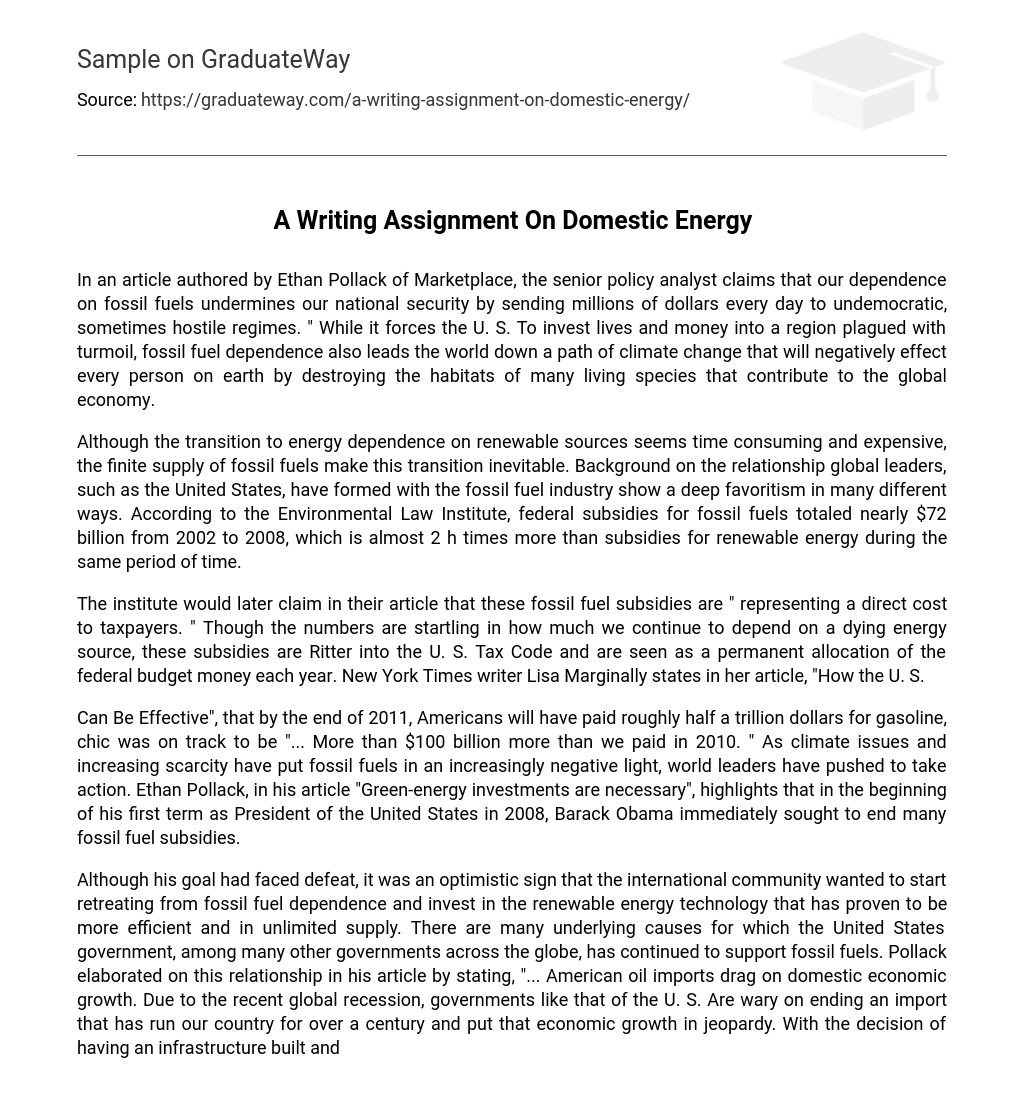In an article authored by Ethan Pollack of Marketplace, the senior policy analyst claims that our dependence on fossil fuels undermines our national security by sending millions of dollars every day to undemocratic, sometimes hostile regimes. ” While it forces the U. S. To invest lives and money into a region plagued with turmoil, fossil fuel dependence also leads the world down a path of climate change that will negatively effect every person on earth by destroying the habitats of many living species that contribute to the global economy.
Although the transition to energy dependence on renewable sources seems time consuming and expensive, the finite supply of fossil fuels make this transition inevitable. Background on the relationship global leaders, such as the United States, have formed with the fossil fuel industry show a deep favoritism in many different ways. According to the Environmental Law Institute, federal subsidies for fossil fuels totaled nearly $72 billion from 2002 to 2008, which is almost 2 h times more than subsidies for renewable energy during the same period of time.
The institute would later claim in their article that these fossil fuel subsidies are ” representing a direct cost to taxpayers. ” Though the numbers are startling in how much we continue to depend on a dying energy source, these subsidies are Ritter into the U. S. Tax Code and are seen as a permanent allocation of the federal budget money each year. New York Times writer Lisa Marginally states in her article, “How the U. S.
Can Be Effective”, that by the end of 2011, Americans will have paid roughly half a trillion dollars for gasoline, chic was on track to be “… More than $100 billion more than we paid in 2010. ” As climate issues and increasing scarcity have put fossil fuels in an increasingly negative light, world leaders have pushed to take action. Ethan Pollack, in his article “Green-energy investments are necessary”, highlights that in the beginning of his first term as President of the United States in 2008, Barack Obama immediately sought to end many fossil fuel subsidies.
Although his goal had faced defeat, it was an optimistic sign that the international community wanted to start retreating from fossil fuel dependence and invest in the renewable energy technology that has proven to be more efficient and in unlimited supply. There are many underlying causes for which the United States government, among many other governments across the globe, has continued to support fossil fuels. Pollack elaborated on this relationship in his article by stating, “… American oil imports drag on domestic economic growth. Due to the recent global recession, governments like that of the U. S. Are wary on ending an import that has run our country for over a century and put that economic growth in jeopardy. With the decision of having an infrastructure built and run by different fossil fuels, Pollack also said that the “… Historical dominance of fossil fuels… ” Make this energy source convenient to businesses and consumers, while alternative energy sources have been forced o be a far more inconvenient and thus overlooked.
Alone, the tax breaks that subsidies create for the production and sale of fossil fuels make it even harder for consumers and members of the industry to part from, explained by Pollack. Amidst the fact that the system for which we rely on fossil fuels is broken, the unwillingness of people to give up these subsidies and look into similar policy for renewable energy make it nearly impossible to initiate an energy source transition. Many policy options exist that make renewable energy the cheap and reliable option that doesn’t put the health of our planet, and the organisms inhabiting it, in jeopardy.
Marginally stated that taxpayer money needs to be diverted from supporting the production of energy and instead to support basic research for renewable sources in creating “… An active private venture capital community. ” She also explains that the research we invest taxpayer dollars into must result in innovative technology, business models, and marketing platforms to help create this new industry while cutting the dependence of foreign fossil fuels and establishing a new export for the United States. Pollack similarly called for the elimination of subsidies for fossil fuels that are a part of our tax code, along with the “… Implicit subsidy for carbon emissions by putting a price on carbon… ” And force the government to end its favoritism of fossil fuels. With many options on how to address the energy dependence issue, domestically and abroad, the elimination of subsidies for fossil fuels are necessary in order to stimulate the transition from fossil fuels to renewable energy. As long as these subsidies are in place, and as long as there is oil in the round, there will not be an incentive for change as the global climate continues to worsen.
The elimination of fossil fuel subsidies put the two sources of energy on the same level while promoting the market for renewable energy and creating revenue for the United States. A growing transition in the infrastructure that is used for global energy is making the switch to renewable energy easier with each passing day. In an article on solar energy, Herman Tarnish notes that in the next 2 h years, the United States will “double its entire capacity of distributed solar – petting in the span of a few short years what it originally took for decades to deploy. This is startling in not only the fact that there is a growing trend, but also that a market for renewable energy is beginning to flourish and investments are being made. Not only is the issue of energy dependence important to us now, but even more so for the children of the future. It is time that we utilize the innovations we have created and use them to create a world that is sustainable without putting our health and the health of the world in jeopardy.





